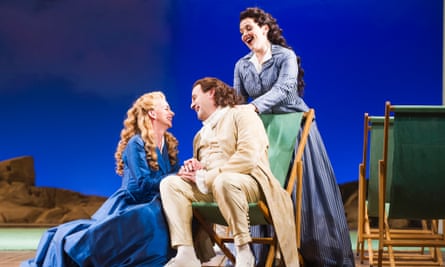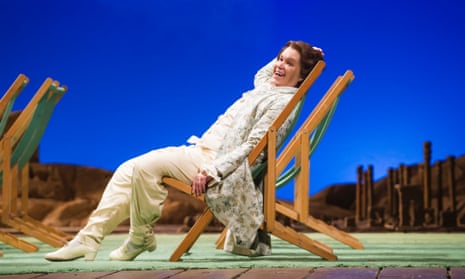“Who would even believe it?” asks Elviro towards the end of Nicholas Hytner’s venerable staging of Handel’s comic opera, Xerxes. It’s a rather loose translation, which could be inserted equally into any of Handel’s operas, but it’s particularly apt here in a work whose absurd plot twists even Handel’s contemporaries found hard to stomach. And yet, on an emotional level, there is something deeply credible about the way in which Handel’s Persian emperor slowly comes to accept that the bonds of love cannot be made and unmade at his command.
The main draw of this umpteenth revival of ENO’s 1985 production, directed here by Michael Walling and conducted by Michael Hofstetter, is the casting of Alice Coote in the title role. Though by no means a natural Handelian, Coote recently released an impressive CD of Handel arias, and her full-bodied tone and tremendous vocal swagger work particularly well with a characterisation that plays the role as a cross between George I and Harry Enfield’s Tim Nice-But-Dim. The emperor’s blind sense of omnipotence translates well into the way Coote effortlessly wrests control away from the pit, slowing the orchestra – at times almost to a standstill – and the way she both inhabits the character as well as exceeds it, revelling in the electricity of her vocal presence. True, her voice was wearing out by the end of the evening, but her depiction of the despot’s reluctant enlightenment is both touching and profound.

Coote is well matched by Sarah Tynan’s haughty but high-spirited Romilda, whose gorgeous voice makes up in purity of tone what it lacks in raw power, and also by the relatively inexperienced Rhian Lois, whose captivating performance as Romilda’s sister, Atlanta, caught perfectly the character’s scheming sauciness as well as the lonely desperation cloaked beneath it. Fellow Harewood artist Catherine Young has less to work with as Amastris, but impresses nonetheless, while Andrew Watts’ Arsamenes and Adrian Powter’s Elviro both carry well. And while Michael Hofstetter’s conducting scarcely benefits from the inevitable comparisons with Charles Mackerras, he holds his own, keeping good contact with the singers and energy levels high in the orchestra.
Hytner’s staging, to designs by David Fielding which scarcely show their age after close to three decades’ service, remains fresh and fluid, thanks in part to its studied humour but mainly to the clarity with which the setting captures what is at stake in the blurred lines dividing passionate folly from genuine love, lines articulated not merely by Xerxes but by the whole phenomenon of 18th-century opera itself.

Comments (…)
Sign in or create your Guardian account to join the discussion